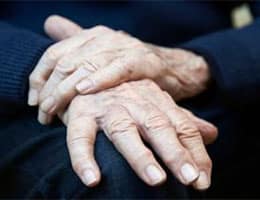 Parkinson is a fairly common surname in English-speaking countries . In any case, it is usually associated specifically with James Parkinson , a British doctor born in 1755 and died in 1824 .
Parkinson is a fairly common surname in English-speaking countries . In any case, it is usually associated specifically with James Parkinson , a British doctor born in 1755 and died in 1824 .
This medical expert was the one who first discovered and described paralysis agitans . This disease, over the decades, became known as Parkinson's disease or Parkinson's disease .
The disorder is often referred to simply as Parkinson's . In our language it can be written as Parkinson's , in lower case and with an accent in the A , as accepted by the Royal Spanish Academy ( RAE ).
Parkinson's, in short, is a neurological disorder that usually affects the elderly . People with Parkinson's experience a rhythmic tremor in their limbs, suffer from muscle stiffness and weakness , and cannot perform voluntary movements with the usual speed and agility.
As time goes by, the effects of Parkinson's intensify. This is because the pigmented neurons in the substantia nigra are progressively destroyed.
In addition to the motor consequences, the disease also has other manifestations. Parkinson's can cause cognitive problems , depression , sleep disorders and damage to the sense of smell .
It is important to note that the diagnosis of Parkinson's is clinical: there are no biological markers that can be detected through laboratory studies or other analyses. As for its treatment , the aim is to extend the individual's functionality as much as possible.
The provision of drugs to address dopamine deficiency and other deficiencies; magnetic and electrical stimulation of the brain; the implantation of a device to send electrical impulses to points in the brain; and physical and language exercises can be part of Parkinson's therapy.
Although there are certain symptoms and signs that are generally associated with Parkinson's disease, some of which are indicated in the previous paragraphs, it is important to note that the condition may be relatively different for each person. If the first ones to appear have a mild intensity, it is common for them to go unnoticed, delaying the diagnosis .
 It is not uncommon for symptoms to first appear on one side of the body and become worse there than on the other side over time. Let's see below some of the most common symptoms , with a detailed explanation of their characteristics:
It is not uncommon for symptoms to first appear on one side of the body and become worse there than on the other side over time. Let's see below some of the most common symptoms , with a detailed explanation of their characteristics:
* tremors : It is perhaps the best known of all, in part because of the exposure that some famous people have given to Parkinson's disease in interviews and documentaries. It usually begins in the hands or fingers, and can occur at rest. Sometimes it is a shaking, other times a rubbing of the thumb and index finger as if the patient were holding a small object (this tremor is known as "pill rolling");
* bradykinesia : also known as slow movement . One of the most terrible consequences of Parkinson's is the slowing down of movement, something that results in increasing difficulty in performing everyday tasks, those that before the disease the patient did automatically and effortlessly . Getting up from a seat and walking can become real challenges;
* muscle stiffness : this symptom of Parkinson's can occur in any region of the body, limiting movement and causing considerable pain;
* lack of balance and posture problems : it can be seen through the hunching of the back and difficulty standing;
* disappearance of some automatic movements : unconscious movements , such as smiling, swinging your arms when walking or even blinking, may begin to disappear as the disease progresses.
